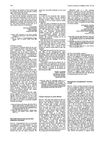 67 citations,
October 2005 in “Annals of Oncology”
67 citations,
October 2005 in “Annals of Oncology” Fulvestrant is a well-tolerated new treatment for advanced breast cancer that may delay chemotherapy.
 2 citations,
March 2013 in “Phytotherapy Research”
2 citations,
March 2013 in “Phytotherapy Research” Ascorbigen increases hair cell growth in a lab setting but does not prevent hair loss from chemotherapy in mice.
 23 citations,
December 2015 in “Anais Brasileiros de Dermatologia”
23 citations,
December 2015 in “Anais Brasileiros de Dermatologia” Permanent hair loss after bone marrow transplant can be caused by chemotherapy or chronic graft-versus-host disease.
 3 citations,
January 2011 in “Wspolczesna Onkologia-Contemporary Oncology”
3 citations,
January 2011 in “Wspolczesna Onkologia-Contemporary Oncology” Scalp hypothermia can prevent chemotherapy-induced hair loss but is not suitable for all patients, and more research is needed to improve prevention methods.
 1 citations,
August 1995 in “Archives of Disease in Childhood”
1 citations,
August 1995 in “Archives of Disease in Childhood” Minoxidil helped a boy regrow his hair after intense chemotherapy for leukaemia.
 49 citations,
October 1994 in “Annals of Oncology”
49 citations,
October 1994 in “Annals of Oncology” Minoxidil not effective in preventing chemotherapy-induced hair loss.
12 citations,
May 2015 in “Journal of the National Comprehensive Cancer Network” Doctors should actively prevent and treat skin side effects in cancer patients to keep them on the best medication and reduce discomfort.
 May 2024 in “Deleted Journal”
May 2024 in “Deleted Journal” Cancer treatments can cause hair loss, but it is often reversible and can be managed with scalp cooling and support.
17 citations,
June 2020 in “Anais brasileiros de dermatologia/Anais Brasileiros de Dermatologia” Scalp cooling is an effective way to prevent hair loss from chemotherapy.
 8 citations,
April 2014 in “Anti-Cancer Drugs”
8 citations,
April 2014 in “Anti-Cancer Drugs” A hormone linked to collagen helps hair grow back in mice after chemotherapy, and may also prevent bone loss.
 48 citations,
February 2017 in “Journal of Cosmetic Dermatology”
48 citations,
February 2017 in “Journal of Cosmetic Dermatology” The conclusion is to use scalp cooling, gentle hair care, and treatments like minoxidil for managing hair loss from chemotherapy, and stresses the need for more research and collaboration in this area.
 20 citations,
September 2013 in “Anti-Cancer Drugs”
20 citations,
September 2013 in “Anti-Cancer Drugs” PTH-CBD could help prevent and treat hair loss caused by chemotherapy in mice.
 11 citations,
August 1997 in “Expert Opinion on Therapeutic Patents”
11 citations,
August 1997 in “Expert Opinion on Therapeutic Patents” Many potential alopecia treatments need more testing to confirm they promote acceptable hair growth with minimal side effects.
 44 citations,
September 2015 in “Annals of Oncology”
44 citations,
September 2015 in “Annals of Oncology” Targeted cancer therapies have a significant but lower risk of causing hair loss compared to chemotherapy.
 March 2020 in “Section 5: Patient safety and quality assurance”
March 2020 in “Section 5: Patient safety and quality assurance” Tofacitinib and baricitinib had an acceptable level of side effects in rheumatoid arthritis patients.
December 2022 in “Journal of The American Academy of Dermatology” Low-dose oral minoxidil combined with topical minoxidil improves hair growth in breast cancer patients with therapy-induced hair loss.
3 citations,
January 1990 in “Cancer chemotherapy and pharmacology” Topical thiols may prevent hair loss caused by certain chemotherapy drugs.
 November 2011 in “Australasian Journal of Dermatology”
November 2011 in “Australasian Journal of Dermatology” Cellulite may be linked to low adiponectin, isotretinoin with UVB can treat psoriasis effectively, permanent alopecia post-chemotherapy resembles a unique hair loss, deodorants may cause fragrance allergies, desmoplastic melanoma is becoming more common, and intensive UVB treatment can give long-term psoriasis remission.
 October 2024 in “Andrology”
October 2024 in “Andrology” Paternal drug exposure can harm fertility, pregnancy outcomes, and offspring health, with specific drugs linked to various reproductive issues.
 April 2024 in “Academic dermatology”
April 2024 in “Academic dermatology” Dermatologists should carefully manage hair loss in cancer patients to improve their quality of life.
February 2023 in “Biological and Clinical Sciences Research Journal” Chemotherapy often causes hair loss, mouth sores, and dry skin.
 2 citations,
August 2013 in “British Journal of Dermatology”
2 citations,
August 2013 in “British Journal of Dermatology” Chemotherapy improved a girl's painful foot condition linked to pachyonychia congenita.
 17 citations,
December 2013 in “Journal of Investigative Dermatology Symposium Proceedings”
17 citations,
December 2013 in “Journal of Investigative Dermatology Symposium Proceedings” Bimatoprost is safe and effective for treating eyelash loss caused by chemotherapy.
 7 citations,
October 2019 in “Klinická onkologie”
7 citations,
October 2019 in “Klinická onkologie” Cancer treatments often cause hair loss and damage, affecting patients' mental health.
 October 2018 in “Annals of oncology”
October 2018 in “Annals of oncology” Topical calcitriol (BPM31543) is safe for preventing hair loss from chemotherapy and shows some effectiveness.
12 citations,
January 2004 in “International Journal of aromatherapy/International journal of aromatherapy” Ocimum oil may promote hair growth and reduce hair loss from cyclophosphamide.
1 citations,
January 2022 in “Journal of Cancer Therapy” Ocoxin improves quality of life for advanced ovarian cancer patients on chemotherapy.
 December 2022 in “BMC women's health”
December 2022 in “BMC women's health” The CNC® prosthetic system improved body image in breast cancer patients with hair loss from chemotherapy but did not significantly change their psychological wellbeing.
13 citations,
April 2010 in “Journal of dermatological science” Chemotherapy-induced hair loss is partly due to decreased laminin-511 and increased laminin-332.
 November 2019 in “Actas Dermo-Sifiliográficas”
November 2019 in “Actas Dermo-Sifiliográficas” Oral minoxidil helps treat hair loss and has reversible side effects.






















